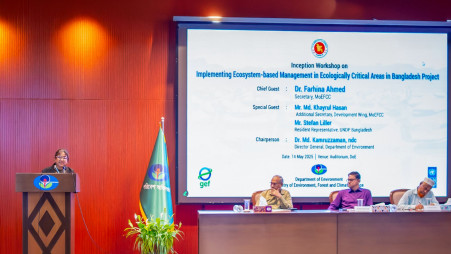02/22/2026

Project launched to safeguard biodiversity degraded ecosystem in critical wetlands
Staff Correspondent | Published: 2025-05-14 22:02:38

To protect biodiversity and promote sustainable, community-led management of Bangladesh’s Ecologically Critical Areas (ECAs), a new initiative was launched Wednesday at a workshop in Dhaka.
The five-year project, titled “Implementing Ecosystem-based Management in Ecologically Critical Areas in Bangladesh (EbM-ECA Project),” is a collaborative effort led by the Ministry of Environment, Forest and Climate Change (MoEFCC), implemented through the Department of Environment (DoE), with support from the UNDP and funding from the Global Environment Facility (GEF).
“This initiative goes beyond biodiversity conservation. It brings together science, indigenous knowledge, and community leadership to restore vital ecosystems while supporting livelihoods of resource users,” said Sonali Dayaratne, deputy resident representative of UNDP Bangladesh.
“Ensuring multi-stakeholders’ coordination and environmental governance is key to successful delivery of the project,” she added.
With a total financing of $13.5 million, this project will pilot through community co-management, innovative ecosystem-based restoration practices, and community-led governance models in Halda River (Chattogram) and Morjat Baor (Jhenaidah), both biodiversity-rich wetlands facing pressure from pollution, overuse of natural resources, and climate change, said the UNDP.
MoEFCC Secretary Farhina Ahmed attended the event as the chief guest.
Emphasising the importance of innovation in natural resource management, she said, “If we can develop a co-management model for natural resource management and biodiversity conservation grounded in an ecosystem-based approach, it can serve as a replicable model both nationally and internationally.”
She also expressed sincere appreciation for the generous support provided by the GEF and reaffirmed a strong commitment to ensuring value for money in all related initiatives.
MoEFCC Additional Secretary (Development Wing) Khayrul Hasan joined as a special guest.
He said, “Effective ECA management calls for innovation, cooperation, and participation from all stakeholders. This is a step in that direction.”
Md Kamruzzaman, director general of the Department of Environment, chaired the workshop.
“While we are implementing this project, we must ensure that people dependent for livelihood on the places must not be affected by project interventions,” he said.
The project’s core components include the design and implementation of a financially viable, ecosystem-based co-management system, effective pollution control and water quality monitoring, biodiversity conservation, alternative livelihoods for vulnerable communities, and capacity building of resource users, government institutions and local stakeholders.
Lessons from these pilots are expected to guide replication in other ECAs across the country. The initiative aligns with Bangladesh’s National Biodiversity Strategy and Action Plan (NBSAP) and supports the Global Biodiversity Framework.
It is expected to benefit over 11,000 hectares of wetlands and directly support communities surrounding the Halda River and Morjat Baor ECAs.
The inception workshop brought together more than 100 participants, including senior officials from MoEFCC, DoE, UNDP, technical agencies, civil society, academia, and development partners.
Discussions focused on creating scalable models of community-based conservation and strengthening institutional mechanisms to safeguard Bangladesh’s rich ecological heritage.
Editor & Publisher : Md. Motiur Rahman
Pritam-Zaman Tower, Level 03, Suite No: 401/A, 37/2 Bir Protik Gazi Dastagir Road, Purana Palton, Dhaka-1000
Cell : (+88) 01706 666 716, (+88) 01711 145 898, Phone: +88 02-41051180-81